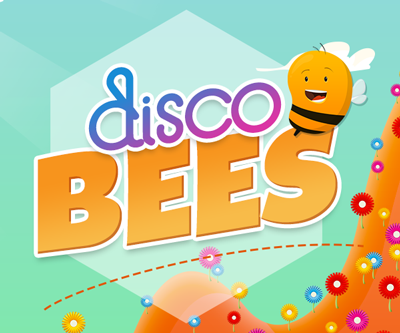
What do you get when you combine a Princeton-educated architect, a Grammy-winning guitarist, and a criminal lawyer? Why, the team behind indie game company Space Inch, of course, who just saw the release of the Android version of their hexagonal puzzle game, Disco Bees. The Apple (AAPL -1.92%) iOS version was released last year and has done well, hitting one million installs just last week. And in the 24 hours after the game showed up on the Google Play store, it received over 80,000 installs.
I recently talked with the principles at Space Inch -- Josh Segall in charge of product management, user acquisition, and business operations; Ari Kardasis, architect and primary front-end developer; and Andy Ross, who tackled most of the backend development and produced the music for Disco Bees. They all met in college and started working together a few years ago.
"We ended up making a game called Say the Same Thing, says Segall, a conceptual word game that they all played at parties and weddings long before bringing it to the mobile app space. "It was popular on iOS and the runner-up for game of the year in three countries," Segall says.
The transition to creating a puzzle game was a no-brainer. "We're little and most companies who make puzzle games are big," Segall says, but the team was confident they brought something unique to the table that would produce a game that's more fun and of higher quality than a lot of the games currently topping the iOS and Google Play charts.
But why bees? And why disco?
It's a convergence of the individual talents and interests the team members bring to the table that's behind the game's look and feel.
"Ari is an architect and mathematician," Segall says. "He did a thesis on hexagon piling in architecture, which led us to creating a hexagonal version of a puzzle game that would be more fun than a lot of the puzzle games out there." Then you add in Andy, "who's a Grammy winning rock guitarist, and we knew we could make a great soundtrack that would sound a lot better than other games out there."

The Waggle Dance
The inclusion of a bee theme was practically compulsory. "Once you're doing hexagons, bees made a lot of sense and we really got into bee science."
When you complete a level in the game, all the bees on the board do a "waggle dance," which is something real bees actually do to relay information to one another. And there's a part of the game dedicated to "zombees," or zombie bees, which are bees taken over by parasites.
I played the game before speaking with the team and it is loaded with bee puns, too. Create several matches in a row and you're greeted with encouraging messages like, "Un-bee-lievable" and "Hive Five!"
In terms financing, Space Inch is entirely self-funded. And while the team is quick to point out you can't rely on "going viral" as a monetization method, they feel having a polished game has certainly contributed to the word-of-mouth traction they've received.
Disco Bees is also "well differentiated," within the puzzle gaming community. "The players know what they like," says Segall. Game play is simple yet surprisingly challenging. Since the board is a hexagon shape, pieces can move in six directions rather than just four. Yet another way the team is confident their game is separated from the puzzle game pack.
And one thing they like in particular is the music. Ross—who you might recognize as the lead guitarist from OK Go—spent a lot of time listening to disco music to, "find a nice arc that could repeat over and over," throughout the levels of the game. Some players have even made requests to "buy the soundtrack."

In-app purchases drive monetization.
The monetization model isn't groundbreaking but works. Disco Bees follows the in-app purchase model, and while the vast majority of players don't spend money in the game, some do to get more lives, make faster progress, and so forth, at $0.99 a pop.
As the team pours their hearts into Disco Bees, I had to ask what their long-terms goals were for Space Inch. "We're 130 among all games on iOS," says Segall. "We started coding in late July, early August of last year and went the first six months with four people [at the company]—now we have 13."
While the team is expanding, and they definitely want to create more games in the future, players can expect, "a lot of development of Disco Bees over the next several months with new levels--and thanks to Ari--they're really unique and fun," Segall says.
And what is the recipe for success in mobile gaming? Kardasis believes it is "...a relentless desire for perfection."
"You can't ever say something is good enough because you'll always be the second best," Kardasis says.
A nugget of wisdom that applies across all industries, to be certain.




